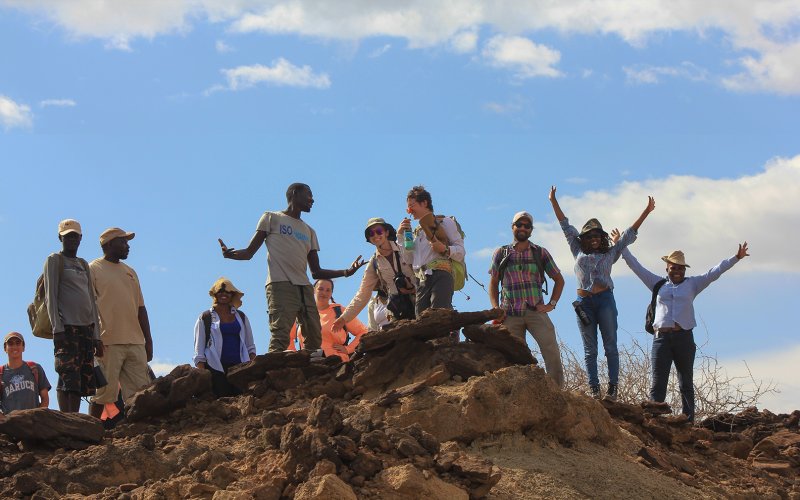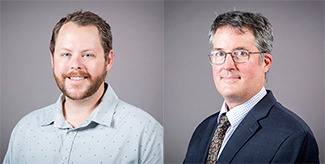New Fieldwork Semester in Kenya Offers Unique Immersion into Research and Culture

ALBANY, N.Y. (June 16, 2022) — Starting this fall, UAlbany will join Stony Brook in offering anthropology students a semester-long study of human origins and evolution in Kenya: The Origins Field School.
“Students will become fully immersed in Kenyan culture, while earning 15 credits that will fulfill key requirements at UAlbany for both the Anthropology and Human Biology majors,” said John Rowan, assistant professor of Anthropology and an affiliate researcher at the Turkana Basin Institute (TBI), founded in 2005 by famed paleoanthropologist and conservationist Richard Leakey.
“We are very excited about this program, given the transformative effects that fieldwork and research immersion learning have for students,” said Marilyn Masson, professor and chair of Anthropology. “Applied experiential learning as part of a team empowers students and sends them home at a higher and more mature level of career preparedness, purpose, confidence and engagement with subsequent classroom learning. There is really no substitute.”
Through the recent pandemic years, such field study opportunities were quite limited, said Masson. One of the advantages of the TBI program is its multiple options in summer and regular semesters and its combinations of complementary courses.
The semester will be divided into five 3-credit areas of study:
- Ecology — students spend two weeks on safari learning about animals and plants of the African ecosystem and what they reveal about the environmental content of human evolution
- Sedimentary geology and geochronology — hiking the badlands of the Turkana Basin, students will see how tectonics and volcanoes shaped Africa’s Great Rift Valley
- Earth’s history — information is gleaned from vertebrae fossils about the appearance, evolution and causes of major groups’ extinction throughout Earth’s existence
- Human evolution — lectures are given by world-famous paleoanthropologists, abetted by labs and field trips, on the study of important fossil finds
- Prehistoric archeology — evidence will be shown of 3 million years of hominin technological adaptations around Lake Turkana, home to the world’s oldest stone tools

John Polk, associate professor of Anthropology and director of Human Biology, has been a key player in making the field school semester possible, aided by Renée Decelle, director of Education Abroad in the Center for International Education and Global Strategy.
“TBI has been developing their facilities and programs in the basin in partnership with Stony Brook since 2005/6,” said Polk. “John Rowan has been conducting cutting edge paleoecological and paleontological research in the Turkana Basin for years. He and I were contacted this spring by TBI’s director, Professor Lawrence Martin of Stony Brook.”
Martin proposed expanding opportunities at TBI for SUNY students through a partnership with UAlbany that would co-brand and promote TBI programs.
“There are many benefits to our students,” said Polk. “The Turkana Basin is one of the most productive field localities for human origins research on the planet. The programs offer an amazing opportunity for our students to gain an immersive experience in another culture, work with leading experts in African ecology, archaeology, geology and both vertebrate and hominin paleontology, and understand how these disciplines integrate into our understanding of human origins.”
Masson also noted that the program will benefit students beyond their majors, “as it adds, through a series of different courses and experiences, the dimension of interdisciplinary STEM approaches to the study of human-environmental relationships, as well as doubling as a study abroad experience.”
Polk called TBI’s facilities first-rate, noted that logistics have been thoroughly worked out, “and the costs are quite reasonable in comparison to living in Albany.”
“The end result,” he said, “is an unparalleled experience where students gain direct access to the science, but more importantly to an exploration of the cultural and environmental context of this work, and a much broader appreciation for the human condition.”
He said TBI is actively engaged with local health clinics and in supporting the diverse communities that live in the area. “There are many more opportunities for programs to be developed through this partnership,” he said.
To get the field school off and running this fall, 10-15 students will need to take part. Applications for fall are being accepted through July 1 at the Stony Brook study abroad program website.




